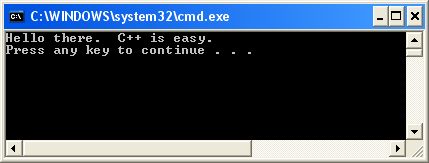Section 2- Strings
3A.2.1 Declaring and Initializing Strings
We've seen strings briefly in the form of string literals. These were phrases inside quotes that we wanted to display in output statements like:
cout << "The final value of someNumber: " << someNumber << endl;
The phrase "The final value of someNumber: " is a string literal, and someNumber is an int variable that holds a numeric value. But can we have a string variable that holds a string value? You bet. We declare a string variable just as we would an int, except we use the word string instead of int:
string thxMom;
So far, so good. But what about assigning a value to this string, thxMom? This part is a little stickier because strings, unlike ints, are not primitive data. The data type string is actually a class, a kind of data type that is more powerful and flexible than a primitive type like int. Also, we usually call variables of classes, objects rather than variables, just to remind us that they hold a more sophisticated kind of data than variables of primitive types.
The good news is, C++ lets you treat string objects almost as though they are primitive data types. So you can, in fact do the following:
thxMom = "Thanks, Mom!";
Once we have done that, we can use the variable thxMom as a string object that contains the value "Thanks, Mom" stored in it. Actually, there is a shorter way to do this, and you are welcome to do so:
string thxMom = "Thanks, Mom!";

3A.2.2 Using Strings in Programs
It is incredibly easy to use strings. Here is a simple example. You'll notice that we have a new #include statement that brings in the <string> class library, needed for strings.
#include <iostream>
#include <string>
using namespace std;
int main()
{
string str;
str = "Hello there. C++ is easy.";
cout << str << endl;
return (0);
}
This, as you can imagine, sends the following to the console:

I realize that we could have created the same effect with the single statement:
cout << "Hello, there. C++ is easy!";